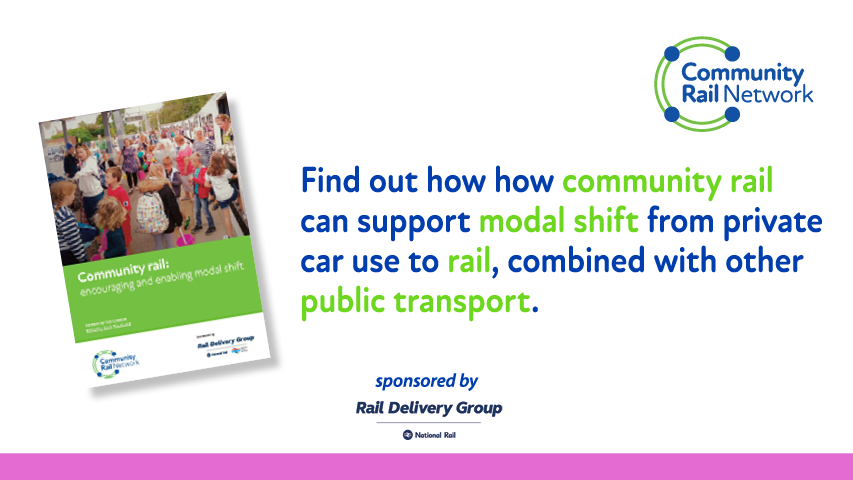
Community-based partnerships and groups around Britain, working with the rail industry, have a crucial part to play in stimulating a shift to more sustainable, climate-friendly travel, a new report shows. It follows new evidence emerging on the need to reduce private car use in favour of public transport, walking and cycling, to decarbonise transport while creating more inclusive access to opportunity.
‘Community rail: encouraging and enabling modal shift’, produced by Community Rail Network with support from Rail Delivery Group, shows the impact community rail can make at local level to spearhead change and help to build back greener from COVID-19. The report explores evidence on the importance and benefits of modal shift and what’s most likely to be effective, relating this to examples in community rail.
A range of local engagement activities, campaigns, and modal integration projects that respond to local needs are showcased in the report, including:
- Surrey Hills to South Downs Community Rail Partnership using station car parks for cycle confidence training to encourage active travel combined with rail;
- Welsh community rail partnerships’ ‘Wales on Rails’ campaign, promoting domestic tourism by rail;
- Three Rivers Community Rail Partnership joining forces with bus and ferry partners to create the ‘Waterside Wanderer’, a multi-modal ticket for Southampton and Hythe;
- East Suffolk Lines Community Rail Partnership supporting ‘Katch’, a new electric taxi-bus service linking rural communities in Suffolk with Wickham Market Station;
- Kent Community Rail Partnership working with Sheppey College students on a range of practical and creative projects at stations, increasing travel confidence and broadening mobility horizons;
- Devon and Cornwall Rail Partnership’s ‘Carbon Reduction Challenge’, working with schools to challenge families to switch journeys to rail to reduce carbon footprint.
The report comes ahead of the Department for Transport’s Transport Decarbonisation Plan, expected to be published this summer, which is due to set out how public transport and active travel can be made ‘the natural first choice’, including using place-based approaches1 Featuring expert insights, such as from the Sustainable Travel Alliance, the report recommends that community rail and other local partners can lead the way in creating effective modal shift initiatives and encouraging collaboration across transport modes, working with industry.
Jools Townsend, chief executive of Community Rail Network, said: “Working with local communities to encourage and enable greener forms of travel – by rail, bus, walking, cycling and shared mobility schemes – brings incredible benefits for individuals, families and their localities. This isn’t a case of ‘persuading’ people to ditch the car: it’s about showing that public transport and active travel offer a great many benefits to our communities and our climate, and it’s about overcoming barriers and widening access to these modes.
“This report underlines the powerful role that community rail and other local initiatives have to play in achieving this positive change. Community rail partnerships and groups around Britain are engaging schools and young people, helping rail and bus partners work together, building confidence and awareness in active travel combined with public transport, and showing that trains, buses, bikes, and feet are the way forward. We look forward to continuing to support their efforts, especially as work ramps up to decarbonise transport and ensure everyone can get around by sustainable, inclusive means.”
Robert Nisbet, director of Nations and Regions at the Rail Delivery Group, added: “Rail is one of the greenest ways to travel and it is vital that we encourage more people onto trains, instead of reverting to more polluting modes like petrol cars and planes, if the government is to meet its ambitious net-zero target. Key to this will be reforming decades old rail fares regulations to deliver a simpler system that incentivises more people back onto the network and guarantees them the best value fare for their journey.”
1 See the DfT’s call for evidence: Decarbonising Transport: Setting the Challenge, 2020, https://assets.publishing.service.gov.uk/government/uploads/system/uploads/attachment_data/file/932122/decarbonising-transport-setting-the-challenge.pdf
